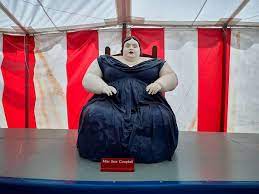Understanding The Various Causes Of Human Obesity
Video Link: https://vimeo.com/182845126
Video Download: Pounds And Inches A New Approach To Obesity 2
Video Stream: Pounds And Inches A New Approach To Obesity 2
Video Link: https://vimeo.com/182845128
Video Download: Pounds And Inches A New Approach To Obesity 1
Video Stream: Pounds And Inches A New Approach To Obesity 1
Understanding Obesity
Obesity is a major problem in the United States today and is one of the leading chronic conditions that contribute to numerous other medical issues which have a significant impact on overall health, mortality, and well-being.
How Many People in America are Obese?
Over the last fifty years, obesity has become a much more common health condition. Today, more than one-third of adults are obese, 35.7% according to data from the Centers for Disease Control and Prevention. Obesity is a major strain on the U.S. Economy, and researchers suggest that the epidemic costs Americans as much as $150 billion dollars due to medical costs and other economic factors.
What Causes Obesity?
Although it is easy to simply blame the individual for his or her obesity, it is important to recognize that there is a serious genetic question that needs to  be answered to help us combat obesity most effectively: What factors contribute to obesity? The goal of the remainder of this article is to discuss three primary causes regarding why obesity is a problem for human beings.
be answered to help us combat obesity most effectively: What factors contribute to obesity? The goal of the remainder of this article is to discuss three primary causes regarding why obesity is a problem for human beings.
Cause Number One: Obesity is a Genetic Issue that Arises at Birth
The first potential cause of obesity is genetic. The Diencephalon is responsible for many of the core functions of the body and is the prime regulator for various hormones.
The Diencephalon is actually a collection of different working sections of the brain, including the Hypothalamus and the Thalamus. Although the Diencephalon is not directly responsible for the release of hormones like Testosterone and Human Growth Hormone, it sends signals to target organs for the hormones to be manufactured (by the testes in regard to Testosterone and by the pituitary gland in regard to HGH).
In regard to obesity, some patients genetically have stronger signals for hunger, which encourages them to overeat. Other people have had issues with thyroid signaling from the hypothalamus, which prevents them from burning fat effectively.
When patients struggle with genetic traits such as these, their struggle with obesity will start early in life and can occur even when parents provide their child with a healthy diet.
This root cause of obesity would explain certain hereditary conundrums, such as how two children raised by the same parents can have significantly different weights in spite of being fed the same meals every day.
Cause Number Two: Obesity is a Genetic Issue that Arises Later in Life
Although some people suffer from obesity as a result of propensities which they were born with, that still leaves many more that subsisted at a healthy weight when they were younger that struggle with obesity after adolescence even though they have not changed their diet.
We've all heard of the Freshman Fifteen, and we understand the environmental basis for it, but what causes otherwise healthy people to develop obesity in the absence of environmental factors? Life changes can have a negative impact on the way that your body processes calories. Take Menopause for example.
In menopause, the normal hormonal baseline for women changes dramatically as Estrogen levels plummet. The sex organs are no longer active, which changes the hormone balance of the body. After Menopause, the ovaries produce significantly less Estrogen.
As a result, the negative feedback mechanism produced by Estrogen in the bloodstream no longer recirculates back to the brain in the same concentration. This causes the brain to produce significantly greater levels of the precursor hormones which stimulate Estrogen production in women that have yet to experience Menopause.
that have yet to experience Menopause.
When the production of these hormones reaches a critical point, it strains the Diencephalon, causing it to refocus energy away from other healthy processes and into the production of these sex-hormone precursors. This is actually the primary cause of the various symptoms of menopause, including hot flashes, emotional instability, and an increase in weight gain.
In the case of this form of Obesity, the development of the disorder is not necessarily the result of abnormal eating habits, but of changes in the way that our bodies react to our normal consumption of calories.
Cause Number Three: Obesity is an Environmental Issue
So the first two causes that we have discussed explain how people with healthy diets can experience obesity. The third form of obesity is the most common form in America. Obesity is most frequently a condition that is caused by the actions of the individual, although the actions of the individual can contribute to temporary or permanent hormone imbalance.
What many people don't understand is that the way you eat can actually have a physiological impact on the make-up of your brain. This means that if you have gotten into bad habits with your diet and exercise routine, the way your brain responds to food will actually change. In many ways, your brain will start to function more like people that were born with obesity.
Your body can lose the ability to properly regulate blood sugar, for example. Or your stomach will start to send stronger signals to the brain when you eat reasonably because your body is used to receiving increased calories. As a result, your body develops a sensitivity to Ghrelin, encouraging you to overeat.
How Triggers Alter Calorie Use and Storage
Environmental triggers for weight storage cause the body to divert calories that were originally intended to be broken down into immediate energy and start converting them directly into adipose fat. The development and aggregation of adipose fat is the literal definition of obesity. Our bodies change the way that they perceive both calories and energy usage, causing the body to place an emphasis on energy storage rather than energy circulation.
Although there are a variety of reasons why weight gain occurs, when your body switches from utilizing energy from the food you eat to storing it, it is bad for your health. From an evolutionary perspective, this was beneficial, because it allowed humans to thrive even when food availability was irregular, but in today's American food-abundant society, this ability to store fat has an imminently negative effect on health and longevity.
Environmental Causes of Obesity:
Obesity and Overeating
In environmental obesity, the body changes the way it utilizes and stores fat as a result of food intake which vastly outweighs nutritional requirements for the day. Although it may seem like there is a direct correlation between calories consumed and obesity, the link is not so clearly defined. Some people's bodies are more flexible with regard to adjusting for different levels of caloric intake, while it seems that others have a propensity to gain weight much easier.
the day. Although it may seem like there is a direct correlation between calories consumed and obesity, the link is not so clearly defined. Some people's bodies are more flexible with regard to adjusting for different levels of caloric intake, while it seems that others have a propensity to gain weight much easier.
Obesity and the Sedentary Lifestyle
Another cause of environmental obesity is the result of changes in activity levels. It is possible to maintain the same diet and gain weight because your activity level has dropped. Some people spend their college years working out and become couch potatoes after they graduate. Other people may love working out but may experience injuries or other factors which prevent them from maintaining the same level of activity.
Obesity and Climate
Weight gain can even be the result of changes in climate. Someone that once lived in a cold climate could move to a temperate environment where their bodies do not expend the same level of energy for temperature control, contributing to weight gain.
Obesity and Changes in Food Availability
Another factor that can contribute to obesity is a sudden change in food availability. If an individual experiences an extended period of deprivation, whether that be the result of famine, poverty, chronic illness, or anorexia, the Diencephalon adjusts in order to adapt to the reduced availability and consumption of calories. After conditions change and food availability increases, this can overwhelm the Diencephalon, causing the body to store fat at a significantly enhanced rate.
One historical example of this form of obesity comes from World War II. In one case, approximately six thousand refugees from Poland were delivered from Russia to India. Their conditions in Russia were deplorable and food was very scarce. In India, they lived in a camp where they were fed standard military rations and were provided cash in order to round out their needs. After only a few months, 85% of the Polish refugees had developed obesity.
Obesity in America Today
Today, one of the most common causes of obesity is the result of the food that we eat, and the availability of calories and nutrition contained within that food. In a healthy, modern diet, people should subsist on a diet that provides calories inefficiently but provides nutrition efficiently. This means that foods like vegetables and lean meats are vital to a healthy diet because they provide high levels of nutritional content while not providing excessive calories.
Obesity and Processed Food
The issue today is that the foods which are cheapest and most widely available are processed and refined foods. These foods provide calories very efficiently, but they do not provide nutrition efficiently. Snacks, fast food, and processed meals contain large amounts of butter, white flour, sugar, and unhealthy oils which the body can rapidly absorb.
The problem is that the Diencephalon is not really equipped to handle this influx of pure caloric intake. As a result, the brain can't figure out what to do with all of the calories entering the body so quickly, and it shifts over to fat storage rather than energy burning. Eating processed foods is a lot like taking  drugs both in the way that the calories are delivered and the way that the body responds to them.
drugs both in the way that the calories are delivered and the way that the body responds to them.
Most drugs become most dangerous when they are processed and refined to a point where the body receives a maximum dose for minimal effort. For example, the coca leaves and poppy plants do have chemical effects on the body, but they are not necessarily dangerous.
After purification and refinement, however, cocaine and heroin are incredibly dangerous and can greatly shorten your lifespan or even lead to immediate overdose and death.
Although the effects are not quite as stark, processed and refined foods can also have a severely negative impact on your health, your life, and your weight. The sugar that you buy at the store is simply purely refined, empty calories.
You eat the sugar and you get a pleasant response from the brain, but you get absolutely no benefit from sugar outside of calorie consumption, which is the biggest contributing factor to obesity. Processed grain is the same way. Processed grain is just pure simple carbohydrates, simply sugar by a different name. Unless the processed grain is fortified, you are getting nothing but calories.
Role of Psychology in Obesity
So, although the first two causes of obesity can only really be treated medically, and cannot be treated effectively through diet alone, that still leaves the third, most common form of obesity, which is caused by the choices that we make. But why do we make those choices? It seems clear that if we eat too much and are too unhealthy, then we will suffer in the long run.
What is it in our brains that makes us overeat?
There has been a lot of research regarding the impact of psychology on obesity, and there has been even more philosophizing regarding the connection between the mind and the stomach. One of the reasons why obesity is so hard to tackle is because it involves our deepest animal instincts. The Diencephalon is kind of like the lizard part of the brain. It is vitally important for the normal function of the human body, but it also controls our primal survival urges.
Diet is one of those survival urges, and the Diencephalon has the ability to adapt the body to a variety of different levels and types of food availability. The problem is that the level of abundance that we experience today has not been the evolutionary norm, and our bodies really have no way to cope with overeating from a purely genetic perspective.
This is why someone can feel guilt and embarrassment over their obesity, but still not be able to overcome it. The pressure from the Diencephalon overwhelms the thinking part of the brain, promoting the individual to find satisfaction through the satiation of thirst and hunger.
There are countless reasons why this takes place. Some people simply don't sustain the willpower to prevent themselves from overheating, some people suffer from depression or other psychological disorders which make finding pleasure through other means more difficult.
These psychological cues combine with physiological changes in the body, making obesity even harder to overcome. The stomach gets accustomed to being stretched, so it takes longer to send satiation signals. The body diverts energy from food directly into fat, increasing hunger by utilizing energy inefficiently.
 Obesity is a psychological and physiological condition that can be incredibly difficult to treat because eating is so ingrained in the way we think as well as the way that we feel.
Obesity is a psychological and physiological condition that can be incredibly difficult to treat because eating is so ingrained in the way we think as well as the way that we feel.
One thing to realize about obesity is that it is not necessarily the result of Compulsive Eating, and the two disorders are completely unique to one another, although there is some overlap.
Compulsive eating is a desire to eat that is divorced from hunger, but the root cause of obesity is an overwhelming hunger response that compels them to eat and overeat. Individuals that are obese have strong desires for things like pastries, sweets, and sodas because these foods and drinks have the ability to provide large numbers of calories very quickly.
Final Thoughts on Obesity
Obesity is a multifaceted problem, and it helps to understand the root causes of obesity in order to more effectively tackle the problem. Whether you are suffering from obesity yourself, or looking to help a loved one, it is important to understand the importance of maintaining a healthy weight.
- What Is Male Hypogonadism? [Last Updated On: December 22nd, 2024] [Originally Added On: July 18th, 2020]
- What Is Low-t And How Can It Effect My Life? [Last Updated On: September 20th, 2024] [Originally Added On: July 22nd, 2020]
- Identification Of Late Onset Hypogonadism In Middle Aged And Elderly Men [Last Updated On: October 21st, 2024] [Originally Added On: July 24th, 2020]
- Importance Of Hormone Balance For A Man's Health [Last Updated On: September 18th, 2024] [Originally Added On: July 25th, 2020]
- Subcutaneous Injection Procedures [Last Updated On: September 17th, 2024] [Originally Added On: July 30th, 2020]
- Genetics And Gene Therapy. What Are Genes? [Last Updated On: September 15th, 2024] [Originally Added On: August 2nd, 2020]
- Whey Protein [Last Updated On: September 13th, 2024] [Originally Added On: August 3rd, 2020]
- Hormone Replacement Therapy Blood Testing [Last Updated On: September 14th, 2024] [Originally Added On: August 7th, 2020]
- Gh-rh [Last Updated On: June 6th, 2025] [Originally Added On: August 12th, 2020]
- How Does Growth Hormone Testing Work? [Last Updated On: February 13th, 2025] [Originally Added On: August 15th, 2020]
- Important Figures In Hormone Replacement Therapy Research [Last Updated On: May 16th, 2025] [Originally Added On: August 16th, 2020]
- Certified Age-management And Longevity Professionals [Last Updated On: February 17th, 2025] [Originally Added On: August 28th, 2020]
- Bio-identical Genotropin Hormone Replacement Therapy [Last Updated On: May 6th, 2025] [Originally Added On: September 4th, 2020]
- HGH Injections [Last Updated On: February 28th, 2023] [Originally Added On: March 7th, 2021]
- Growth Hormone Injection Treatment For Women [Last Updated On: February 17th, 2025] [Originally Added On: March 8th, 2021]
- Buy Growth Hormone Injection Treatment For Men [Last Updated On: February 19th, 2025] [Originally Added On: March 9th, 2021]
- The Conscious Evolution Institute For Quality Hormone Replacement Therapy [Last Updated On: October 29th, 2024] [Originally Added On: March 10th, 2021]
- 25 Foods That Can Improve Your Health [Last Updated On: October 28th, 2024] [Originally Added On: March 11th, 2021]
- Change Your Life With A Conscious Evolution Lifestyle [Last Updated On: February 19th, 2025] [Originally Added On: March 12th, 2021]
- Male Hormone Replacement Therapy Blood Panel [Last Updated On: February 18th, 2025] [Originally Added On: March 15th, 2021]
- Getting Started With Hormone Replacement Therapy [Last Updated On: February 19th, 2025] [Originally Added On: March 17th, 2021]
- Buy Female Blood Diagnostics [Last Updated On: October 25th, 2024] [Originally Added On: March 18th, 2021]
- Low Testosterone and other Sex Drive Killers that Cause Low Libido in Men [Last Updated On: February 14th, 2025] [Originally Added On: May 1st, 2022]
- The effects of Human Growth Hormone (HGH) on the skin [Last Updated On: February 18th, 2025] [Originally Added On: May 8th, 2022]
- Testicle Tanning – See Through the Hype [Last Updated On: February 19th, 2025] [Originally Added On: May 30th, 2022]
- Lean Muscle Mass Critically Important to Healthy Aging [Last Updated On: February 18th, 2025] [Originally Added On: June 28th, 2022]
- Can Vitamin B6 Help Relieve Anxiety? [Last Updated On: February 14th, 2025] [Originally Added On: August 2nd, 2022]
- A Chemical Found in Common Household Items May Disrupt a Hormone Necessary for Healthy Pregnancy [Last Updated On: March 25th, 2025] [Originally Added On: August 2nd, 2022]
- Matching Libidos Ensure Healthy Relationships [Last Updated On: March 5th, 2025] [Originally Added On: December 11th, 2022]
- How Fluctuating Libidos Affect Aging Men and Women [Last Updated On: February 19th, 2025] [Originally Added On: January 10th, 2023]
- Adopting a Conscious Evolution Lifestyle for Improved Health and Longevity [Last Updated On: February 9th, 2025] [Originally Added On: February 9th, 2025]
- Male Hormone Replacement Therapy: Diagnostic Blood Test Regime [Last Updated On: February 14th, 2025] [Originally Added On: February 13th, 2025]
- Unleash the Power of Vitamin B6: The Natural Antidote to Anxiety! [Last Updated On: February 14th, 2025] [Originally Added On: February 14th, 2025]
- The Impact of Human Growth Hormone Deficiency in Men [Last Updated On: February 16th, 2025] [Originally Added On: February 15th, 2025]
- Maintaining Lean Muscle Mass: A Crucial Facet of Healthy Aging [Last Updated On: February 17th, 2025] [Originally Added On: February 15th, 2025]
- Introduction to Testicle Tanning [Last Updated On: February 11th, 2025] [Originally Added On: February 16th, 2025]
- Introduction to Hormone Replacement Therapy [Last Updated On: February 17th, 2025] [Originally Added On: February 17th, 2025]
- Importance of Matching Libidos for Healthy Relationships [Last Updated On: February 19th, 2025] [Originally Added On: February 19th, 2025]
Word Count: 2309






